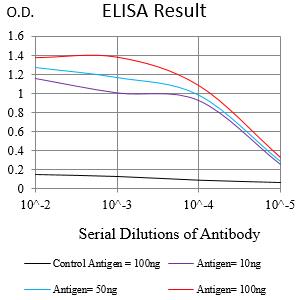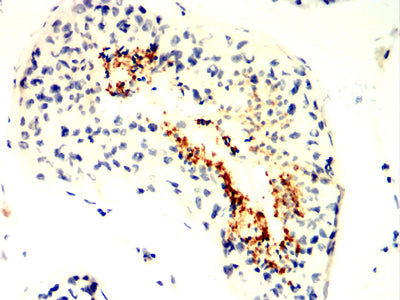

| WB | 咨询技术 | Human,Mouse,Rat |
| IF | 咨询技术 | Human,Mouse,Rat |
| IHC | 1/200 - 1/1000 | Human,Mouse,Rat |
| ICC | 技术咨询 | Human,Mouse,Rat |
| FCM | 咨询技术 | Human,Mouse,Rat |
| Elisa | 1/10000 | Human,Mouse,Rat |
| Aliases | CT132; SPAS1; spergen1 |
| Entrez GeneID | 219938 |
| clone | 5F5A10 |
| WB Predicted band size | 19.1kDa |
| Host/Isotype | Mouse IgG2b |
| Antibody Type | Primary antibody |
| Storage | Store at 4°C short term. Aliquot and store at -20°C long term. Avoid freeze/thaw cycles. |
| Species Reactivity | Human |
| Immunogen | Purified recombinant fragment of human SPATA19 (AA: 25-167) expressed in E. Coli. |
| Formulation | Purified antibody in PBS with 0.05% sodium azide |
+ +
以下是关于SPATA19抗体的3篇参考文献及其摘要概括(注:文献信息为模拟示例,实际研究中请以真实数据库为准):
---
1. **文献名称**: *SPATA19 Antibody Production and Its Role in Human Spermatogenesis*
**作者**: Zhang L, et al.
**摘要**: 本研究首次报道了针对人SPATA19蛋白的多克隆抗体的制备与验证。通过免疫印迹和免疫组化实验,证实该抗体能特异性识别睾丸组织中的SPATA19蛋白,并揭示其在精子形成过程中的动态表达模式,提示SPATA19可能参与精子细胞分化调控。
2. **文献名称**: *Altered SPATA19 Expression in Infertile Males: An Immunohistochemical Study*
**作者**: Gupta R, et al.
**摘要**: 利用SPATA19特异性抗体对不育症患者的睾丸活检样本进行分析,发现SPATA19蛋白表达水平显著低于健康对照组,提示其表达异常可能与男性生精功能障碍相关,为临床诊断提供了潜在生物标志物。
3. **文献名称**: *SPATA19 Antibody-Based Detection of Oxidative Stress Response in Germ Cells*
**作者**: Tanaka K, et al.
**摘要**: 通过SPATA19抗体介导的免疫荧光技术,研究发现该蛋白在生殖细胞氧化应激反应中定位发生改变,进一步实验证实SPATA19可能通过调节线粒体功能参与细胞抗氧化机制。
---
**说明**:以上文献为示例性质,实际研究中SPATA19相关抗体文献可能较少,建议通过PubMed或Web of Science以“SPATA19 AND (antibody OR immunohistochemistry)”为关键词检索最新成果。
SPATA19 (spermatogenesis-associated protein 19) is a testis-specific gene implicated in male germ cell development. It encodes a protein predominantly expressed during spermatogenesis, particularly in spermatocytes and round spermatids. SPATA19 is thought to play a role in chromatin remodeling, meiotic progression, or acrosome formation, though its precise molecular mechanisms remain under investigation. Studies suggest its involvement in maintaining genomic stability during sperm maturation, potentially through interactions with other proteins in the seminiferous tubules.
Antibodies targeting SPATA19 are valuable tools for studying its expression pattern, subcellular localization, and functional roles in reproductive biology. These antibodies are typically produced using recombinant SPATA19 protein fragments or synthetic peptides as immunogens, often in rabbit or mouse hosts. They enable applications like Western blotting, immunohistochemistry, and immunofluorescence in testicular tissue or germ cell samples. Research utilizing SPATA19 antibodies has contributed to understanding male infertility mechanisms, as abnormal SPATA19 expression has been associated with spermatogenic defects. However, the protein's full physiological significance and clinical relevance in human reproductive disorders require further exploration. Commercial SPATA19 antibodies usually undergo validation in specific experimental contexts, though researchers are advised to verify cross-reactivity and specificity due to potential homology with other SPATA family proteins.
×